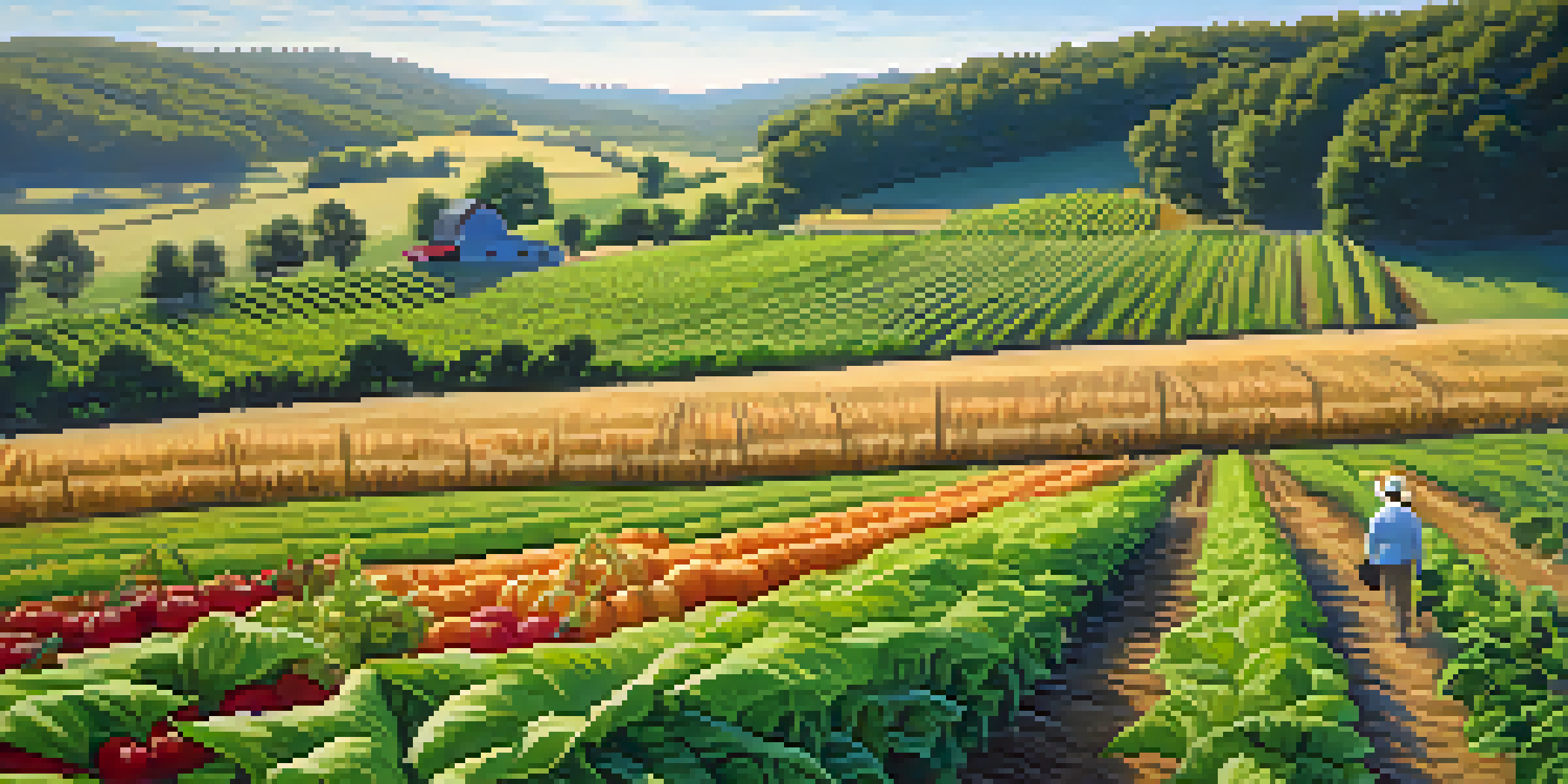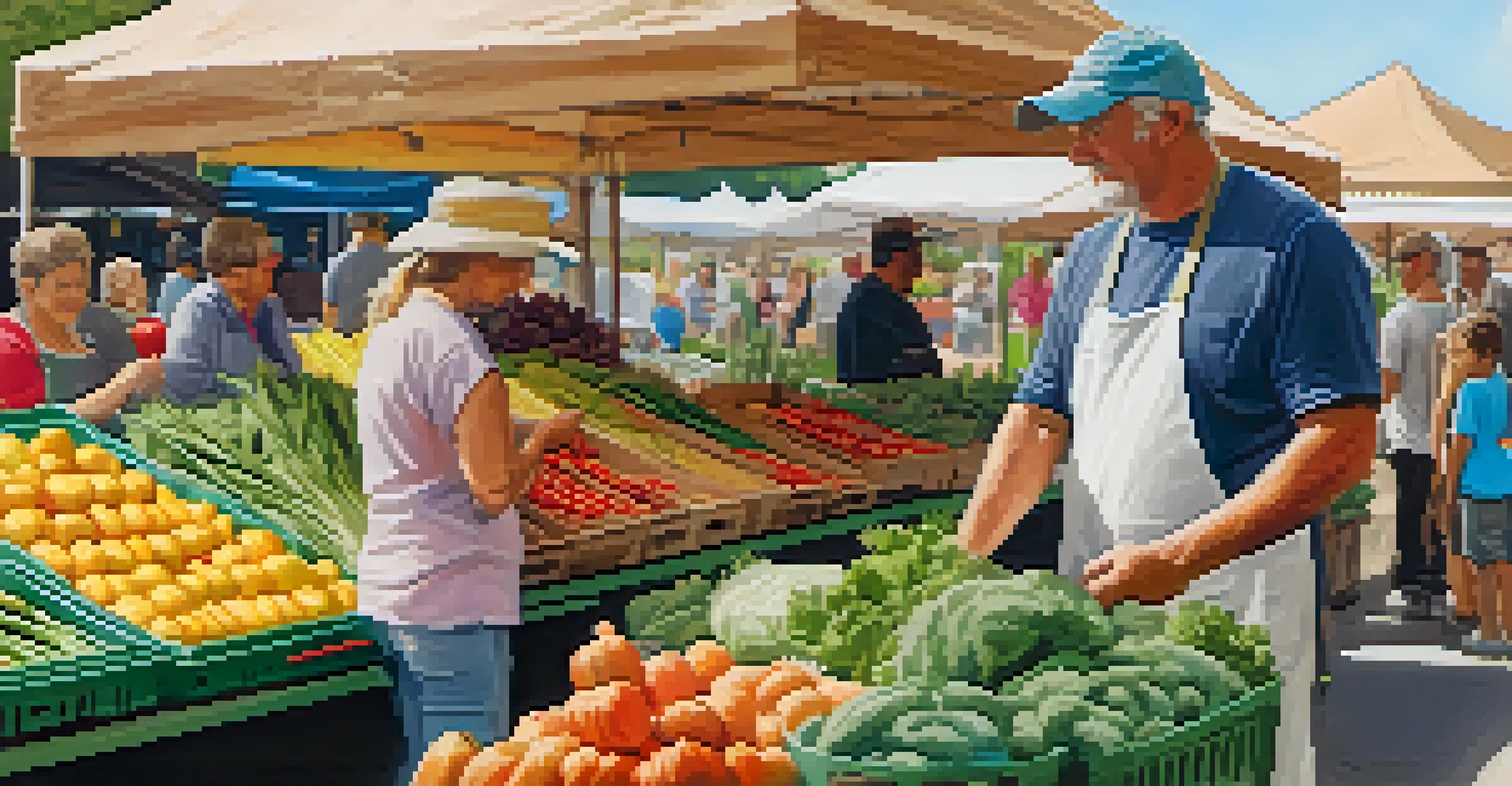Sustainable Agriculture Practices in North Carolina Farms

Understanding Sustainable Agriculture and Its Importance
Sustainable agriculture refers to farming practices that meet current needs without compromising future generations' ability to meet theirs. This approach is crucial for maintaining ecological balance, ensuring food security, and preserving biodiversity. In North Carolina, sustainable practices are particularly significant due to the state's rich agricultural history and diverse ecosystems.
Sustainable agriculture is the key to a healthier planet and a more secure food future.
By focusing on environmentally friendly methods, farmers can reduce their reliance on chemical fertilizers and pesticides, which can harm both soil and water quality. Additionally, sustainable agriculture promotes the use of renewable resources and emphasizes local food systems, enhancing community resilience. This holistic approach not only supports farmers but also benefits consumers and the environment.
As North Carolina continues to face challenges such as climate change and population growth, sustainable agriculture emerges as a vital solution. It encourages innovation and adaptation, enabling farmers to thrive while caring for the land. Understanding these principles is the first step toward appreciating the efforts made by local farmers.
Crop Rotation: A Key to Soil Health
One of the most effective sustainable practices is crop rotation, which involves alternating the types of crops grown in a specific area over seasons. This technique helps prevent soil depletion and reduces the risk of pests and diseases. By rotating crops, farmers can enhance soil fertility and structure, ultimately leading to healthier plants and higher yields.

For example, a farmer might plant nitrogen-fixing legumes one season, which enriches the soil, and then follow with a nutrient-demanding crop like corn. This not only improves crop productivity but also minimizes the need for synthetic fertilizers. Crop rotation exemplifies how simple changes in farming practices can lead to sustainable outcomes.
Sustainable Agriculture Benefits All
Sustainable agriculture practices enhance ecological balance, food security, and community resilience while reducing reliance on harmful chemicals.
In North Carolina, many farmers have adopted this practice to maintain soil health and productivity. By embracing crop rotation, they can ensure that their farms remain resilient against environmental challenges while producing quality food for the community.
Cover Cropping: Protecting and Enriching Soil
Cover cropping is another sustainable practice that involves planting specific crops during the off-season to protect and improve soil health. These cover crops, like clover or rye, prevent soil erosion, suppress weeds, and enhance soil structure. They also contribute organic matter to the soil, which boosts its fertility and promotes beneficial microbial activity.
The future will be green, or not at all.
In North Carolina, farmers who utilize cover crops have seen significant benefits, including improved water retention and reduced runoff. This practice is particularly important in a state where heavy rains can lead to soil erosion and nutrient loss. By protecting the soil in this way, farmers can maintain productivity and ensure long-term sustainability.
Moreover, cover crops can serve as a habitat for beneficial insects and pollinators, contributing to biodiversity. This interconnectedness highlights the importance of sustainable practices in creating a thriving ecosystem that benefits both agriculture and the environment.
Integrated Pest Management: Balancing Nature and Farming
Integrated Pest Management (IPM) is a sustainable approach that combines various strategies to manage pests while minimizing harm to the environment. Instead of relying solely on chemical pesticides, IPM emphasizes monitoring pest populations, using biological controls, and implementing cultural practices to deter pests. This balanced method helps maintain healthy ecosystems.
In North Carolina, many farmers have adopted IPM techniques to reduce their reliance on harmful chemicals. For instance, introducing natural predators, like ladybugs for aphid control, can effectively manage pest populations while preserving beneficial insects. This approach not only protects crops but also contributes to a healthier environment.
Innovative Practices Improve Yields
Techniques like crop rotation and cover cropping help maintain soil health and boost productivity, showcasing the potential of sustainable farming.
Ultimately, IPM encourages farmers to be proactive and informed in their pest management strategies. By understanding the ecology of their farms, they can make decisions that support both agricultural productivity and environmental health.
Agroforestry: Merging Agriculture and Forestry
Agroforestry is an innovative practice that combines agriculture and forestry to create sustainable land-use systems. In North Carolina, this means integrating trees and shrubs into crop and livestock systems, which can enhance biodiversity, improve soil health, and provide additional income streams for farmers. By blending these practices, farmers can create resilient ecosystems.
For example, farmers might plant fruit trees alongside their crops, which not only provides shade but also diversifies their income. The trees can also help prevent soil erosion and improve water retention, creating a more sustainable farming environment. Agroforestry exemplifies how multifunctional landscapes can benefit both farmers and the ecosystem.
This practice aligns with the growing trend towards sustainability, as it allows farmers to maximize their land's potential while minimizing negative environmental impacts. As more North Carolina farms explore agroforestry, the potential for sustainable agriculture grows, demonstrating the interconnectedness of our farming systems.
Water Conservation Techniques for Sustainable Farming
Water conservation is a critical aspect of sustainable agriculture, especially in regions like North Carolina, where seasonal droughts can impact crop yields. Farmers are increasingly adopting techniques such as drip irrigation and rainwater harvesting to ensure efficient water use. These methods not only conserve water but also improve crop health by delivering moisture directly to the root zone.
Drip irrigation, for instance, allows farmers to apply water directly to plants, reducing waste and evaporation. Rainwater harvesting captures and stores rainwater for later use, providing an additional water source during dry spells. These practices demonstrate how farmers can adapt to changing climate conditions while promoting sustainability.
Community Connections Support Farmers
Community Supported Agriculture (CSA) fosters direct relationships between consumers and farmers, promoting transparency and sustainable practices.
By implementing water conservation techniques, North Carolina farmers can safeguard their resources and maintain productivity. This proactive approach highlights the importance of thoughtful water management in achieving long-term sustainability in agriculture.
Community Supported Agriculture: Building Local Connections
Community Supported Agriculture (CSA) is a model that connects local farmers directly with consumers, fostering a sense of community and shared responsibility. In North Carolina, many farms offer CSA programs, allowing consumers to purchase shares of the harvest in advance. This system not only supports local agriculture but also promotes sustainable practices by reducing the carbon footprint associated with food transportation.
By participating in a CSA, consumers receive fresh, seasonal produce while directly supporting their local farmers. This relationship encourages transparency and trust, as consumers know exactly where their food comes from. Additionally, CSAs often prioritize sustainable farming practices, ensuring that the food is not only fresh but also grown responsibly.

As more people seek to make conscious food choices, CSAs are becoming increasingly popular. This trend highlights the importance of community engagement in promoting sustainable agriculture, as it fosters a connection between consumers and the land.
The Future of Sustainable Agriculture in North Carolina
The future of sustainable agriculture in North Carolina looks promising as more farmers embrace innovative practices and technologies. With growing awareness of environmental issues and the importance of food security, the movement towards sustainability is gaining momentum. Farmers are increasingly collaborating with researchers, organizations, and consumers to explore new methods and share knowledge.
As these practices become more mainstream, we can expect to see a shift in agricultural policies that prioritize sustainability. This could lead to increased funding for research, education, and resources that support farmers in their transition to sustainable practices. The collective effort toward sustainability can create a healthier environment and a more resilient food system.
Ultimately, the journey toward sustainable agriculture is a shared responsibility. By supporting local farmers and advocating for sustainable practices, we can all play a role in shaping the future of agriculture in North Carolina and beyond.